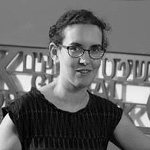Female Public Figures Claim their Voices in the Israeli Political Sphere
March 25, 2019
By Tally Kritzman Amir
The Israeli political realm is gearing up for elections, and some of the voices that dominate the public sphere are women, but not in the ways they have in the past. This year, the traditional roles of models, actresses and politicians seem both blurred and upended.
Recently model, actress and attorney Rotem Sela responded after watching a television interview where Rina Matzliah, the news anchor, questioned Miri Regev, the minister of cultural affairs. During the interview, Regev commented about the possibility of Palestinian Israelis sitting in the coalition after the elections, rather than in the opposition, where they are now, suggesting an inherent problem. The silence of Matzliah, the anchor, prompted Rotem Sela to respond on Instagram "What is the problem with the Arabs? Dear god, there are also Arab citizens in this country. When the hell will someone in this government convey to the public that Israel is a state of all its citizens and that all people were created equal, and that even the Arabs and the Druze and the LGBTs and — shock — the leftists are human."
The post attracted a response, condemning her civic egalitarian position from Prime Minister, Benjamin Netanyahu and from Regev. Netanyahu responded on Facebook, in a tone some viewed as a "mansplanation." He wrote, "An important correction: Israel is not a country of all its citizens. According to the Nation-State Law that we passed, Israel is the nation-state of the Jewish nation — and its alone."
Sela, however, received strong support from other female models, actresses and artists, including Gal Gadot, the actress who played "Wonder Woman," Yael Abekasis, an actress and model, Oshrat Kotler, a news anchor, and Shlomit Malka, a model and others.
The trend surprised some who tend to see models as apolitical and focused on appearance. But, in the recent political climate, models and women in the entertainment business are claiming space in the public sphere, using their platforms and public following to start controversial and politicized discussions on national identity, while enduring the harsh critique with mutual support and "sisterhood."
The trend stands in sharp contrast to the ways that women's presence in the public sphere has been compromised in Israel. Billboards depicting women in all sectors including fashion, politics and entertainment have been defaced. Some municipalities banned billboards showing women, a policy that was enjoined by the Israeli Supreme Court. There are fewer female candidates in the political parties in this year's elections. This recent effort of women in the entertainment business to reclaim the space and regain a voice stands in sharp contrast to the effort to marginalize women in the public sphere, and is perhaps the backlash of this effort. It is also an effort for them to break a "glass ceiling" and be more than models, actresses, entertainers, using the public attention they draw for political purposes.
At the same time that models and actresses are exercising their political speech, female political leaders are depoliticizing their campaigns. Minister of Justice Ayelet Shaked launched a provocative (and disturbing) campaign video on erev Purim, in which she uses her appearance in what seems like an attempt to promote a "perfume" called "Fascism," while in the process promoting her political agenda about restraining the power of the Israeli Court and increasing governmentality. Minister Regev initiated an event on Israeli fashion as the main celebration of the International Women's Day, to which she appeared in a designer dress. So while the "models" are more "political," the "politicians" are more "model-like," assuming stereotypical gender roles and focusing attention on their physical bodies and sexuality even when present and active in the public sphere.
Perhaps this trend stems from the fact that the political realm is so performative these days. The prominence of social media, a realm that falls on the boundary between the private and public sphere, allows women's voices to be heard. The lines between public affairs and show business, between appearance and substance are so blurred, that performance is necessary for anyone's message to be heard by the public. This brings out the politician in some female models, and the model in some politicians. The impact of these socially visible acts of women on the Israeli politics still remains to be seen.
 Dr. Tally Kritzman-Amir, z”l, was an Israel Institute Visiting Associate Professor, Harvard Department of Sociology, and a Senior Lecturer at the College of Law and Business, Israel. She was a 2018 GCRL Scholar-in-Residence at the HBI.
Dr. Tally Kritzman-Amir, z”l, was an Israel Institute Visiting Associate Professor, Harvard Department of Sociology, and a Senior Lecturer at the College of Law and Business, Israel. She was a 2018 GCRL Scholar-in-Residence at the HBI.